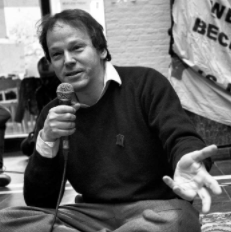Free people never die …
In loving memory of our friend, comrade, and mentor David Graeber. This page offers a selection of books and other media by David Graeber. David Rolfe Graeber (February 12, 1961 – September 2, 2020) was an American anthropologist, anarchist, activist, and author known for books such as Debt: The First 5000 Years (2011), The Utopia of Rules (2015) and Bullshit Jobs: A Theory (2018).
“I have no doubt that he was the most significant anarchist thinker of my generation.” –Andrej Grubačić shares some thoughts on David’s sudden passing. https://www.pmpress.org/blog/2020/09/03/in-loving-memory-david-graeber/
Featured Content

Mutual Aid: An Illuminated Factor of Evolution
Every page of this new edition of Mutual Aid has been beautifully illustrated by N.O. Bonzo and includes artwork by GATS and insightful commentary by David Graeber, Ruth Kinna, Andrej Grubacic, and Allan Antliff.

Everything Must Change!: The World after COVID-19
Contributors: Tariq Ali, David Adler, Gael García Bernal, Larry Charles, Noam Chomsky, Brian Eno, Daniel Ellsberg, Kenneth Goldsmith, David Graeber, Johann Hari, Maja Kantar, Stephanie Kelton, Stefania Maurizi, Evgeny Morozov, Maja Pelević, Vijay Prashad , Angela Richter, Saskia Sassen, Saša Savanović, Jeremy Scahill, Richard Sennett, John Shipton, Astra Taylor, Ece Temelkuran, Yanis Varoufakis, Roger Waters, Slavoj Žižek, and Shoshana Zuboff.
Everything Must Change! brings together prominent commentators from around the world to present a rich and nuanced weighing of progressive possibilities in the wake of the COVID-19 pandemic.

ANTHROPOLOGY FOR KIDS
A SERIES OF BOOKS, WORKSHOPS AND CONVERSATIONS EACH FULL OF PICTURES AND STORIES ABOUT WHAT IT MEANS TO BE A HUMAN.
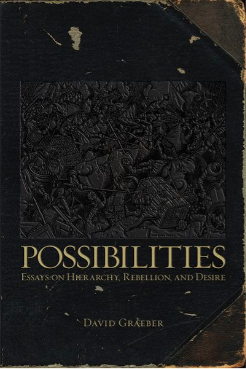
Possibilities: Essays on Hierarchy, Rebellion, and Desire (e-book)
Released 2007
In this collection, David Graeber revisits questions raised in his popular book, Fragments of an Anarchist Anthropology. Employing an unpretentious style to convey complex ideas, these twelve essays cover a lot of ground: the origins of capitalism, the history of European table manners, love potions and gender in rural Madagascar, the phenomenology of giant puppets at street protests, and much more. But they’re linked by a clear purpose: to explore the nature of social power and the forms that resistance to it have taken—or might take in the future.

Direct Action: An Ethnography (e-book)
Released 2009
In the best tradition of participant-observation, anthropologist David Graeber undertakes the first detailed ethnographic study of the global justice movement. Starting from the assumption that, when dealing with possibilities of global transformation and emerging political forms, a disinterested, “objective” perspective is impossible, he writes as both scholar and activist. At the same time, his experiment in the application of ethnographic methods to important ongoing political events is a serious and unique contribution to the field of anthropology, as well as an inquiry into anthropology’s political implications.
The case study at the center of Direct Action is the organizing and events that led to the dramatic protest against the Summit of the Americas in Québec City in 2001. Written in a clear, accessible style (with a minimum of academic jargon), this study brings readers behind the scenes of a movement that has changed the terms of debate about world power relations. From informal conversations in coffee shops to large “spokescouncil” planning meetings and teargas-drenched street actions, Graeber paints a vivid and fascinating picture. Along the way, he addresses matters of deep interest to anthropologists: meeting structure and process, language, symbolism, representation, the specific rituals of activist culture, and much more.
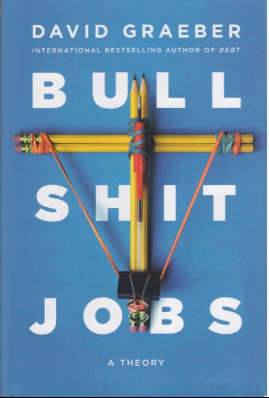
Bullshit Jobs: A Theory
Released 2018
Does your job make a meaningful contribution to the world? In the spring of 2013, David Graeber asked this question in a playful, provocative essay titled “On the Phenomenon of Bullshit Jobs.” It went viral. After a million online views in seventeen different languages, people all over the world are still debating the answer.
There are millions of people—HR consultants, communication coordinators, telemarketing researchers, corporate lawyers—whose jobs are useless, and, tragically, they know it. These people are caught in bullshit jobs.
Graeber explores one of society’s most vexing and deeply felt concerns, indicting among other villains a particular strain of finance capitalism that betrays ideals shared by thinkers ranging from Keynes to Lincoln. Bullshit Jobs gives individuals, corporations, and societies permission to undergo a shift in values, placing creative and caring work at the center of our culture. This book is for everyone who wants to turn their vocation back into an avocation.
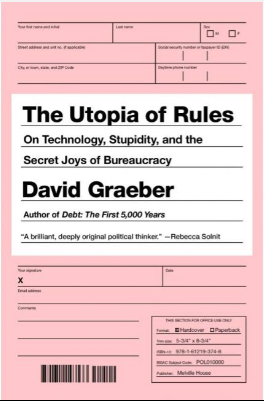
The Utopia of Rules: On Technology, Stupidity, and the Secret Joys of Bureaucracy
Released 2017
Where does the desire for endless rules, regulations, and bureaucracy come from? How did we come to spend so much of our time filling out forms? And just how much are our lives being ruined by all this nonstop documentation?
To answer these questions, anthropologist David Graeber traces the peculiar and unexpected ways we relate to bureaucracy today and reveals how it shapes our lives in ways we may not even notice. Is the inane, annoying paperwork we confront every day really a cipher for state violence? And is the capitalist promise of salvation-through-technology just a tool for the powerful to exert more control? Graeber provides a forceful, radical answer to these questions, though he also suggests that there may be something perversely appealing—even romantic—about bureaucracy.
Leaping from the ascendance of right-wing economics in the second half of the twentieth century to the hidden meanings behind James Bond, Sherlock Holmes, and Batman, The Utopia of Rules is at once a powerful work of social theory and an entertaining reckoning with popular culture.
An essential book for our times, The Utopia of Rules is sure to start a million conversations about the institutions that rule our lives—and the better, freer world we should, perhaps, begin to imagine for ourselves.
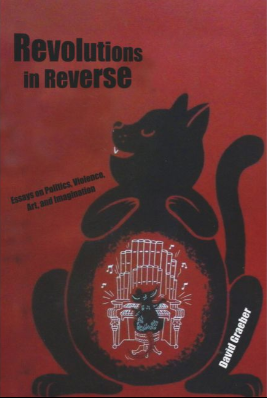
Revolutions in Reverse
Essays on Politics, Violence, Art, and Imagination
Released 2011
Capitalism as we know it appears to be coming apart. But as financial institutions stagger and crumble, there is no obvious alternative. There is good reason to believe that, in a generation or so, capitalism will no longer exist: for the simple reason that it s impossible to maintain an engine of perpetual growth forever on a finite planet. Yet faced with this prospect, the knee-jerk reaction is often to cling to what exists because they simply can’t imagine an alternative that wouldn’t be even more oppressive and destructive. The political imagination seems to have reached an impasse. Or has it?
In this collection of essays, David Graeber explores a wide-ranging set of topics including political strategy, global trade, debt, imagination, violence, aesthetics, alienation, and creativity. Written in the wake of the anti-globalization movement and the rise of the war on terror, these essays survey the political landscape for signs of hope in unexpected places.
At a moment when the old assumption about politics and power have been irrefutably broken the only real choice is to begin again: to create a new language, a new common sense, about what people basically are and what it is reasonable for them to expect from the world, and from each other. In this volume Graeber draws from the realms of politics, art, and the imagination to start this conversation and to suggest that that the task might not be nearly so daunting as we d be given to imagine.
